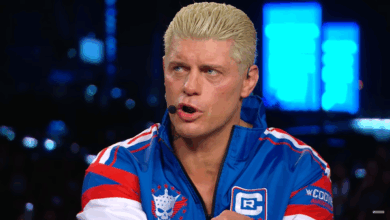Malakai Black Discusses Mental Health And How Zelina Vega Has Been A Big Part Of His Rehabilitation
Malakai Black has learned how to be happy.
Speaking on the Drinks With Johnny podcast, the newly revealed AEW Superstar discussed a variety of topics including his past and how his mindset has evolved over time. Black began by sharing a story from his teenage years where he realized that his surroundings were not appropriate for someone so young.
“I remember when we were 13/14/15-year olds, I was really heavily into skateboarding and alternative music. I used to hang out almost every day with my group of friends who are all squatters and they would squat building and stuff. But that culture back then, there was a lot of drugs involved. There was a lot of people addicted and in a very unhealthy mental place,” he explained. “I remember one specific point, I was 15-years old and I remember waking up in that place after another night of way too much alcohol for a 15-year old, and I look around and there’s a dude literally injecting himself and I just go, “Wow.” It’s one of those things where you’re like, ‘I don’t think a 15-year old needs to be in this surrounding.'”
Black then discussed his parents and revealed how he felt misunderstood at home and how it wasn’t until he moved out that it became a comfortable place for him and that relationship could begin to heal.
“My mom used to tell me, ‘Whenever I think back on your childhood, I always wonder where you were.’ I’m like, ‘What do you mean?’ She said, ‘You were never home.’ I’m like, ‘Yeah because I didn’t want to be home.’ My mom knows why I didn’t want to be home. It’s just one of those things where I just tried to get away from my house, from my parents all the time. I didn’t want to be around them. I felt misunderstood. Home, for me, was not a comfortable place. Home became a comfortable place when I no longer lived at home. When I was 18/19 I moved out of my parents’ house. I got an opportunity to move out and I jumped on it. I could barely afford rent. The rent took all of my money for the most part, but I had to get out. I had to escape. It’s funny, actually, when I created that gap, the relationship between that actually became better. I kind of healed itself. It’s strange to see now that when I look back at that time I can think of it more fondly than I could 10/15 years ago,” said Black.
For the first handful of years after moving out, however, life took a toll on Black and he says that he accepted the fact that he might live a short, albeit eventful life. He said the following:
“When I finally moved out I went through a 4/5-year phase where I was just mentally annihilated because my body, my mind for 19 years never had a chance to process things from my childhood. The family that I’d lost, friends that I’d lost, people that killed themselves, people that overdosed. I couldn’t process it. So, in that period of time from 19-25, I was finally able to process a lot. But then, there’s also stuff that happened in between those times that eventually I remember being completely derailed and just thinking to myself, having a mindset of, ‘If I die when I’m 30 years old, I’m f**king okay with that because at least I’ve done all these cool things and it doesn’t matter anymore because happiness is not for me. So, let me live this incredibly fast and destructive lifestyle.'”
The former WWE Superstar continued on to say that a lot of his best matches came when he was at his lowest point mentally. He was treating himself so poorly, that he admits to feeling like an evil person for a very long time.
“I think all that creativity, all that anger, all that frustration, all the sadness, all the hurt can create such creative passion,” he began by saying. “It literally is sometimes, and it’s sad to say, sometimes the best fuel to create some of your best work. I’ve had some of the best matches when I was mentally at my lowest point. Even when I was 28 and I got diagnosed with depression, and now having to learn how to deal with it, getting in therapy and stuff like that. Making sure I understand the process of my brain and all the stuff that I was doing that I didn’t even know I was doing. All this really unhealthy behaviour that I was displaying, not towards just myself but people around me. I felt evil for a very, very long time. I felt like a really evil person.”
Caught in a vicious cycle, Black was worried that he would lose his wrestling career if he wasn’t sad or depressed. As a result, he kept surrounding himself with people that he knew were objectively bad to be around.
“There was a time in my life where I thought that I was going to lose my wrestling career because I thought if I wasn’t sad or if I wasn’t depressed, I wouldn’t have any fuel to create. I wouldn’t have any fuel to make anything of myself and I would lose all the stuff that I had worked for. So, all this pain and anguish, and I hate using those words, they sound so edgy, but it’s not fun to have this really unhealthy mindset where you’ve convinced yourself that you can only be good if your absolutely f**king horrible and you destroy shit and you deliberately get involved with people you know are not good for you,” Black explained. “You get involved with people that will never understand you, are not on the same wavelength as you and you know are going to be bad for you so you deliberately stay in these situations and then halfway through it you get this weird, ‘What the f**k am I doing’ and this strange guilt trip and you’re trying to yank yourself out of it and that turns into shit. Whatever way you were trying to spin the bottle, it all ends in the same manner. You created this maze for yourself mentally that you can’t escape. You feel awful all the time. You feel negative all the time, but you don’t want to because now you’ve reached the point in your life where you’re over it. I remember one of my friends once told me the definition of hate is to be obsessed with something until the day you die. I was like, ‘I don’t want that. I don’t want to carry that with me.'”
Black married (then) fellow WWE Superstar Zelina in 2018, and credits her for being a big part of his rehabilitation. Here is what he said:
“A big part of my rehabilitation, let’s call it that, is my wife. She was one of the people that for the first time in my life when I met her, I just met someone who was just in such a different wave of energy than I’ve ever been used to. There was no pressure, there was no awkwardness, there was no ‘you have to’ or ‘you should be.’ There was no trying to change me, trying to make me something I wasn’t and that was a big shocker for me because now I’m like, ‘Okay, I’m happy, and this can’t be good. I’m sure she’ll f**k me over at some point.'”
Mental health requires upkeep and Black ackowedges that there will be times when he reverts to old habits, but knows that he has the tools to readjust and get back on a more positive track.
“I’m sure there are times when it’s going to be tough again, but I feel right now I have equipped the tools that I need to either fight it, deal with it, or move forward from it. A lot of people still think from my past that I’m still this negative, abusive (towards myself) kind of person, which makes it hard because people have this level of expectation of you and then that’s just no longer who you are and who you can be because you’ve grown away from that. You’re no longer involved with that. It’s at that moment where you really see who will truly support you and who’s like, “No, I don’t like this new guy,” he said.
He goes as far as saying that the process of being released has allowed him to reflect on himself better than he could if he was still with the company.
“It’s a never-ending process,” Black said. “I think that’s also why this process of me being released has been so good because it allows me to reflect on myself a lot better than having the pressure of you need to do this, you need to do that, you need to always put the company ahead of everything. I don’t have to do that right now.”
Black concluded by saying that the transition is a difficult one to make after years of having only one reference point. You need to keep your mind focused see beyond the obstacles so that you’re not continually reversing any progress you make.
“It’s been a transition,” Black admitted. “I’m 36. It’s been a transition of three years and every once and a while you’ll have those flare-ups of the old you but in your head you know that’s the old you, stop it, that’s not how you should respond and then you get over it. Even then, that’s not easy. If you only have one point of reference continually for 33 tears, you’ll lash out from that persona, you’ll lash out from that part. The change is violent, unpleasant, awkward, and nothing about it, even when I say that sounds appealing, but you want to change so bad because you know the ways that you’ve been living are only going to get you so far in life and all you’re doing is reversing all of your actions continuously. So, you’re going to have to bite the bullet on it and go, ‘No, in order for me to be truly happy….’ You got to see past that hill and see what’s behind the hill and that’s where you got to keep your mind.”
On June 2, WWE released Aleister Black despite a recent return to TV following months of “Dark Father” vignettes. It didn’t take long for him to find a new home, however, as he appeared on AEW Dynamite: Road rager on July 7. At the show, he attacked Arn Anderson and Cody Rhodes and was revealed to be Malakai Black.
Reports revealed that the reason Black was able to debut in AEW so quickly is due to an oversight by WWE following Aleister being called up to the main roster abruptly in 2019. Learn more here.
If you use the quotes above, please credit the original source with a h/t and link back to Fightful for the transcription.




